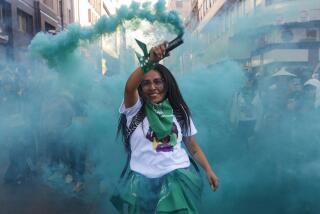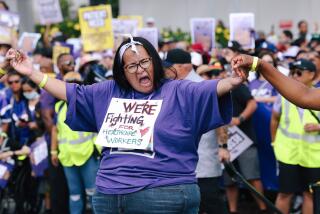Tens of thousands protest conditions in Brazil
This post has been corrected. See the note at the bottom for details.
SAO PAULO, Brazil — Tens of thousands of protesters in Brazil held rallies in at least 11 capital cities Monday, the fifth straight day of demonstrations in opposition to such issues as rising public bus fares and police violence.
Marches coordinated on social networks took place in cities including Sao Paulo, Rio de Janeiro and Belo Horizonte, where police fired tear gas and rubber bullets on protesters, and Brasilia, where a small group climbed onto the roof of Congress.
In Sao Paulo, estimates indicated at least 65,000 people filled the main arteries of South America’s largest city in the fifth and largest protest in two weeks organized by the student-heavy “Free Fare Movement” against a 10-cent hike in the city’s bus fare. Support for the group has mushroomed since a widely publicized crackdown by military police Thursday that left 120 protesters and journalists injured.
PHOTOS: Brazilians protest rising public transport cost
“I think we’re seeing something that started with the legitimate complaint about the bus fare, but now it’s clear we’re now seeing a more general dissatisfaction, especially amongst the young,” said Laurindo Leal Filho, professor of sociology at the University of Sao Paulo.
“But the main reason for the big jump in support is the abuses of the police, who’ve showed they have no idea how to deal with social movements,” Leal Filho said. “That’s why I’m going to protest myself.”
As 5,000 protesters moved through downtown Sao Paulo on Thursday, police fired rubber bullets and tear gas on the crowds without warning and assaulted some protesters and bystanders who had their hands in the air chanting ‘no violence,’ leading to denunciations of abuse both in the national media and the government.
Over the next three days, groups protesting government investments made in preparations for the World Cup rather than in areas such as healthcare or education expressed support for the Free Fare Movement and clashed with police as the country kicked off the FIFA Confederations Cup, widely seen as a test run for the 2014 World Cup. At the opening ceremony in Brasilia on Saturday, 39 protesters were injured and 30 arrested, and on Sunday police used tear gas on crowds outside the famous Maracana stadium in Rio.
“The police abused their power last week and for no reason, since they are just workers like us,” said Josi Paixao, a 39-year-old nurse’s assistant marching across a freeway bridge in Sao Paulo on Monday. “The price of our bus system is absurd. We’re trying to make life more accessible for regular Brazilians.”
Two weeks ago, the Sao Paulo bus fare for a standard one-way trip increased to about $1.50. Workers on minimum wage who take two buses a day can end up spending more than 25% of their monthly income on transportation.
In Rio, the local press estimates at least 30,000 people participated in protests directed largely at transportation fees, while other demonstrations took place in the state capitals Fortaleza, Vitoria, Maceio, Belem, Salvador, Curitiba and Porto Alegre.
In Sao Paulo, the protests have been marked by the notable absence of conflict with police officers, who ride slowly in front of crowds across the city. Many demonstrators cheer as passengers on buses wave.
Over the last decade, Sao Paulo has powered forward economically under popular presidents from the left-leaning Workers’ Party, Luiz Inacio Lula da Silva and his successor, Dilma Rousseff, though growth has stagnated in recent years.
But protesters in Sao Paulo on Monday and some analysts said the currents leading to the protests were not directly about growth, but public representation and services, including the military police, which was formed and trained by the military dictatorship and has been accused of carrying out executions.
“In Brazil, the public system is unprepared in general. Schools are underprepared, hospitals are underprepared, and the police couldn’t be any different,” said Gilberto Dimenstein, columnist at the newspaper Folha de Sao Paulo, Brazil’s largest, in a video posted on its website. “Maybe they’re just ‘prepared’ for when no one can see them, when they are operating in the city’s poor outskirts.”
Folha de Sao Paulo had published an editorial opposed to the protests Thursday morning but radically changed its coverage after witnessing scenes of police action, in which seven of its reporters were injured.
For the record, 8:44 p.m. June 17: A previous version of this post said tens of thousands of protesters in Brazil held rallies in at least 11 capital cities Monday, the fourth straight day of demonstrations in opposition to such issues as rising public bus fares and police violence. Monday was the fifth straight day of demonstrations.
ALSO:
U.S. and EU agree to launch free-trade talks
Edward Snowden calls U.S. intelligence ‘aggressively criminal’
Iran’s next president promises more openness on nuclear program
Bevins is a special correspondent.
More to Read
Start your day right
Sign up for Essential California for news, features and recommendations from the L.A. Times and beyond in your inbox six days a week.
You may occasionally receive promotional content from the Los Angeles Times.





